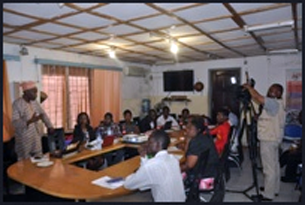Group calls for effective implementation of the National Health Act 2014

A group of Civil Society representatives and media practitioners have called for effective implementation of the National Health Act 2014 amongst other policies, laws and commitments aimed at improving access to maternal health care in Nigeria.
The group made this call during a CS-Media forum organised by Development Communications (DevComs) Network in Lagos on the 5th of February 2015. The CS-Media forum is an activity under the MacArthur Foundation-supported project: bridging the gap between CSO and media to demand accountability in maternal health in Nigeria.
Speaking about the objective of the forum, the Programme Officer in charge of media, Mr. Ayodele Adesanmi said year 2015 is a crucial year to the MDG 5 target of reducing maternal mortality ratio by three-quarter.
He said, ‘’Nigeria is still making progress but we have not achieved the MDG goal to reduce maternal mortality rate to about 250 per 100, 000 live births by 2015. This leaves us to ponder on the possibility of achieving this goal in less than 365 days to the MDG deadline’’.
According to him, the forum was organised to bring the media and civil society together to discuss issues around maternal health accountability and forge ways of demanding accountability.
The President, Lagos State Civil Society Partnership (LACSOP), Barrister Ayo Adebusoye, said that Nigerians needed to begin to count it an important issue when a woman dies while giving life to a child and the media (both print and broadcast) should pick it up more.
Quoting a research report, Barr. Ayodele said one of the key barriers to access for women in Lagos is the high out-of-pocket cost of consumables for the provision of long-acting and reversible contraception (LARCs), including the burden of personally paying for gloves, surgical blades and gauze/cotton wool.
"If the government of Lagos funds the provision of consumables in support of the FP Blueprint, it will save the lives of mothers and children while promoting economic development at all levels" he said.
During a group work on the key provisions and impact of the National Health Act, participants observed that effective implementation of the National Health Act could benefit mothers and children.
It was also observed that the National Health Act is expected to protect and promote the rights of the people to have access to health care services.
In addition, the participants observed that the Basic Health Care Provision Fund is to ensure the delivery of basic health services to the people and prioritize other health services that may be provided within available resources.
Consequently, the group led by DevComs Network and LACSOP recommended effective and speedy implementation of the National Health Act 2014, with the believe that there will be light at the end of the tunnel.
The group of journalists and CSOs also advocate for training and retraining of health workers as well as improved access to information to increase access to maternal health services and bridge the gap between the educated and uneducated women in Nigeria.












